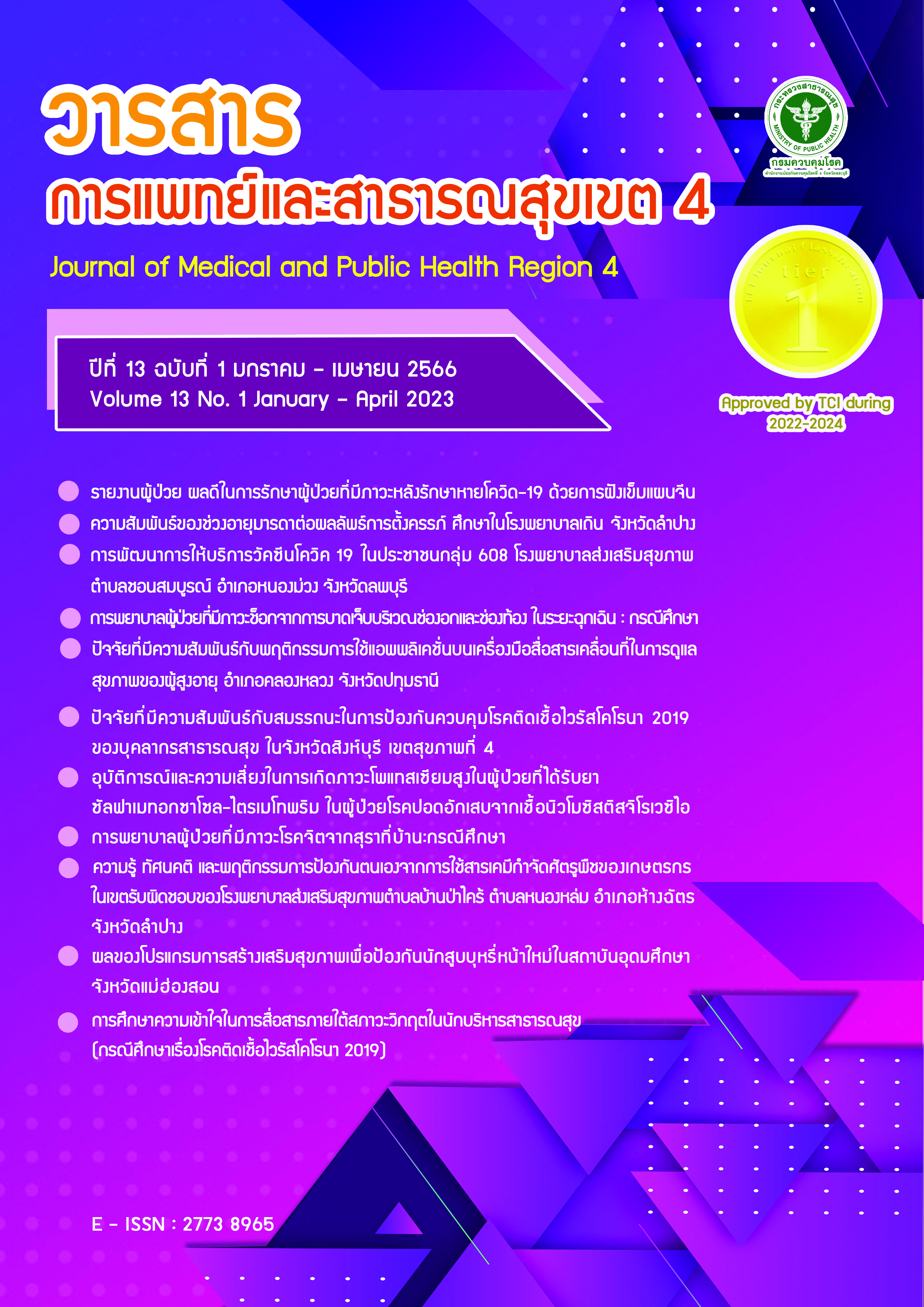Factors associated to application usage behaviors on mobile communication devices for health care among elders in Khlong Luang district, Pathumthani province
Main Article Content
Abstract
The objectives of this current research were to study the behavioral level using mobile applications in health care of the elderly and to determine the factors related to the behavior of using mobile applications in the health care of the elderly. The sampling group in this study was 385 people living in Khlong Luang District, Pathum Thani Province, selected using multistage sampling, and the data were collected by using questionnaires. Index of item objective congruence of the questionnaires was equal to 0.83, while reliability of the questionnaires calculated from Cronbach’s alpha coefficient was equal to 0.85. Data were analyzed using descriptive statistics, such as averages, percentages, standard deviations, correlation test using chi-square statistic, and Pearson Product Moment Correlation. The results show that 213 out if 385 people or 55.3% had behavior using mobile applications in health care of the elderly at moderate level. In addition, the results demonstrate the relationship between variables on mobile application behavior in health care of the elderly. For example, the variables were status, lifestyle, use of mobile communication tools to search the Internet, use of Google applications, and knowledge and attitudes of using applications in health care of those elderly. The behavior of using applications on mobile communication devices was statistically related to health care among the elderly (P < 0.05). In summary, families, communities, and related agencies should encourage the elderly to have a better understanding and attitude to use applications on communication devices as the tools for their more effective health care.
Article Details

This work is licensed under a Creative Commons Attribution-NonCommercial-NoDerivatives 4.0 International License.
References
Department of older persons. Statistics of Thai elderly and register in their house registration book, January 2022. [internet]. 2022 [cited 2022 Mar 6]; Available from: https://www.dop.go.th/th/know/side /1/1/1159. (in Thai)
Foundation of Thai gerontology research and development institute. Situation of population aging in Thailand, exploring the opportunities and challenges. [internet]. 2022 [cited 2022 Feb 10]; Available from https://thaitgri.org/ ?p=40044. (in Thai)
National Statistical Office. Active ageing index of Thai elderly. Bangkok: Text and journal publication company limited; 2017. (in Thai)
Bangkokbiznew. “Elder” new era of internet addiction. [internet]. 2019 [cited 2022 Nov 12]; Available from: https://www.bangkokbiznews.com/business/854410. (in Thai)
Chaladkid D, Jeerapattanatorn P. Factors Affecting Levels of Digital Literacy on Smartphone Devices of the Elderlyin Bang Khae District, Bangkok. Journal of MCU Haripunchai Review 2020;4(1):91-101. (in Thai)
Vanichyanukod D, Anatho S, Thongrin S. The process of internet acceptance for developing the quality of life of senior citizens. Dhonburi Rajabhat University Journal 2017;11(2):60-73. (in Thai)
Guo Z, Zhu B. Does Mobile Internet Use Affect the Loneliness of Older Chinese Adults? An Instrumental Variable Quantile Analysis. International Journal of Environmental Research and Public Health 2022;19(9):55-75.
Pathumthani Provincial Office. Summary of the Pathum Thani provinces. [internet]. 2021 [cited 2022 Mar 4]; Available from: pathumthani_news/attach_file/pathum_summary.pdf. (in Thai)
Srinoon S, Numkham L, Hongbai W, Kummabut J, Hoolphoklang S, Winaiprasert P, et al. Health Status and the Health Needs of the People: a Case Study of a Community in Klong Luang District Municipality,Pathumthani Province. Journal of Public Health 2017;47(1):55-66. (in Thai)
Schwartz NE. Nutritional knowledge, attitudes, and practices of high school graduates. Journal of the American Dietetic Association 1975;66(1):28–31.
Bloom BS, Hastings JT, Madaus GF, Baldwin TS. Hand book on formative and summative evaluation of student learning. New York: McGraw Hill; 1971.
Best JW. Research in Education. 3rd ed. Prentice Hall Inc: New Jersey;1977.
Pakdeemualchon A, Rattanasimakul K. Utilization Pattern and Facebook Media Literacy in Elders. Journal of Management Science Chiangrai Rajabhat University 2022;7(2):1-29. (in Thai)
Sespiani KA, Ernungtyas NF. Connecting Elderly and Digital Devices: a Literature Review of User Interface Studies for Indonesian Elders. The Journal of Society and Media 2022;6(1):139-56.
Rueangyot C , Choompolsathien A. Social media literacy among the elderly. Media and Communication Inquiry 2022;4(1):144-69. (in Thai)
Samuel LB. Discovering Mass Communication. Illinois. Scott Foresman and Company: Glenview;1972.
Liang X, Xiong F, Xie F. The effect of smartphones on the self-rated health levels of the elderly. BMC Public Health; 2022;22:508.


